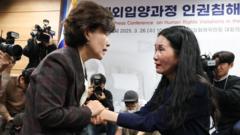The Truth and Reconciliation Commission of South Korea has released a damning report on the country's adoption practices, admitting to serious human rights violations involving the mass exportation of at least 170,000 children for adoption since the 1950s. The inquiry, initiated in 2022, found that a lack of government oversight had led to widespread issues within private adoption agencies motivated by profit, including fraud, falsified records, and coercion.
Historically, South Korea has exported more children for adoption than any other nation, predominantly to Western countries. Although recent years have seen the country take steps to reform its adoption processes, voices of adoptees and their biological parents resonate with pain and trauma born from flawed systems. "This is a shameful part of our history," stated Park Sun-young, chairperson of the commission, during an emotional press briefing. Adoptees' experiences range from fortunate placements in loving homes to severe hardships, with many still seeking answers about their origins.
The commission's investigation found that since the 1960s, numerous adoptees filed petitions highlighting fraudulent practices in the adoption process. Out of the 367 petitions received, 56 individuals were recognized as victims of human rights abuses. This ongoing inquiry is expected to conclude in May 2024.
The report elaborated on how foreign agencies pressured Korean counterparts to meet monthly adoption quotas, giving rise to an unregulated, profit-driven industry. The lack of government regulation allowed adoption agencies to charge exorbitant fees and accept "donations," transforming a humanitarian effort into a lucrative business venture. The commission highlighted cases where birth mothers had not provided proper consent, and reports were falsified, making children appear abandoned and misrepresenting their identities.
The ramifications of these practices have left many adoptees with false identities, complicating their quests for information about their biological families and leaving them vulnerable without adequate legal protections. The commission has recommended an official government apology and adherence to international adoption standards to prevent future abuses.
Efforts to rectify these systemic issues have led South Korea to introduce a new law ensuring that all overseas adoptions will be managed by a government ministry instead of private agencies, effective July 2023. However, as the country grapples with its past, many victims, like Inger-Tone Ueland Shin, continue to voice their struggles. Adopted by a couple in Norway, who later faced legal setbacks concerning her adoption’s legitimacy, she recounted, "They took better care of the dog than they ever did of me."
While the commission's findings provide some validation for the suffering endured, Inger-Tone reflects on her painful journey—hoping that no child will have to experience the same fate. "I sincerely hope they do not adopt any more children out of Korea," she said, underscoring the urgent need for change as South Korea faces its dark chapter in adoption history.




















